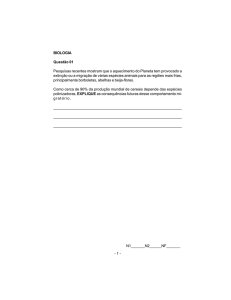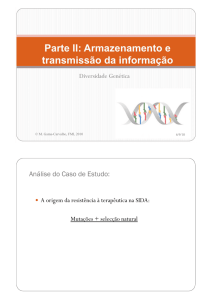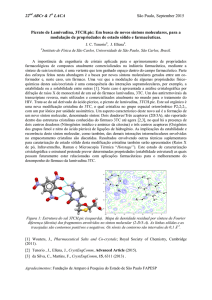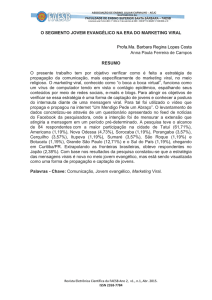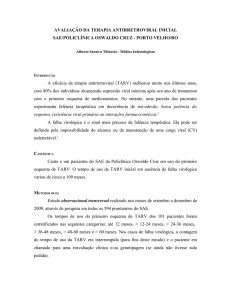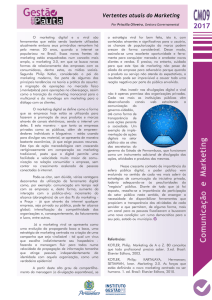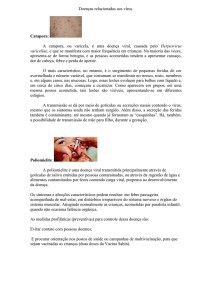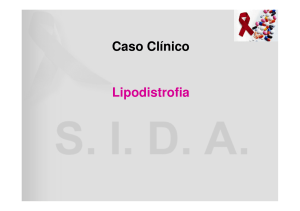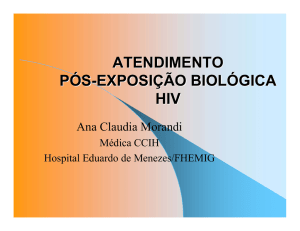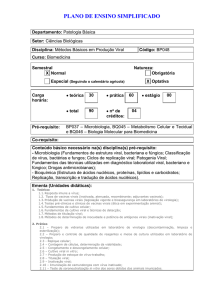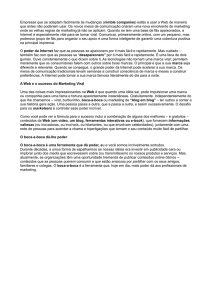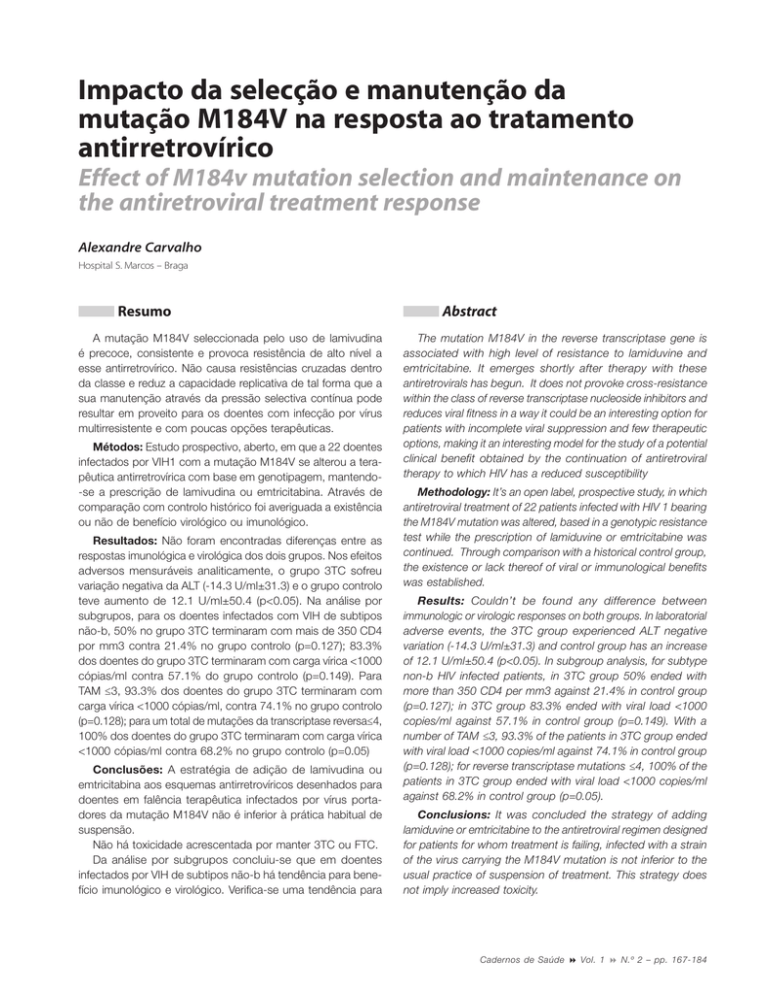
Impacto da selecção e manutenção da
mutação M184V na resposta ao tratamento
antirretrovírico
Effect of M184v mutation selection and maintenance on
the antiretroviral treatment response
Alexandre Carvalho
Hospital S. Marcos – Braga
Resumo
A mutação M184V seleccionada pelo uso de lamivudina
é precoce, consistente e provoca resistência de alto nível a
esse antirretrovírico. Não causa resistências cruzadas dentro
da classe e reduz a capacidade replicativa de tal forma que a
sua manutenção através da pressão selectiva contínua pode
resultar em proveito para os doentes com infecção por vírus
multirresistente e com poucas opções terapêuticas.
Métodos: Estudo prospectivo, aberto, em que a 22 doentes
infectados por VIH1 com a mutação M184V se alterou a terapêutica antirretrovírica com base em genotipagem, mantendo-se a prescrição de lamivudina ou emtricitabina. Através de
comparação com controlo histórico foi averiguada a existência
ou não de benefício virológico ou imunológico.
Resultados: Não foram encontradas diferenças entre as
respostas imunológica e virológica dos dois grupos. Nos efeitos
adversos mensuráveis analiticamente, o grupo 3TC sofreu
variação negativa da ALT (-14.3 U/ml±31.3) e o grupo controlo
teve aumento de 12.1 U/ml±50.4 (p<0.05). Na análise por
subgrupos, para os doentes infectados com VIH de subtipos
não-b, 50% no grupo 3TC terminaram com mais de 350 CD4
por mm3 contra 21.4% no grupo controlo (p=0.127); 83.3%
dos doentes do grupo 3TC terminaram com carga vírica <1000
cópias/ml contra 57.1% do grupo controlo (p=0.149). Para
TAM ≤3, 93.3% dos doentes do grupo 3TC terminaram com
carga vírica <1000 cópias/ml, contra 74.1% no grupo controlo
(p=0.128); para um total de mutações da transcriptase reversa≤4,
100% dos doentes do grupo 3TC terminaram com carga vírica
<1000 cópias/ml contra 68.2% no grupo controlo (p=0.05)
Conclusões: A estratégia de adição de lamivudina ou
emtricitabina aos esquemas antirretrovíricos desenhados para
doentes em falência terapêutica infectados por vírus portadores da mutação M184V não é inferior à prática habitual de
suspensão.
Não há toxicidade acrescentada por manter 3TC ou FTC.
Da análise por subgrupos concluiu-se que em doentes
infectados por VIH de subtipos não-b há tendência para benefício imunológico e virológico. Verifica-se uma tendência para
Abstract
The mutation M184V in the reverse transcriptase gene is
associated with high level of resistance to lamiduvine and
emtricitabine. It emerges shortly after therapy with these
antiretrovirals has begun. It does not provoke cross-resistance
within the class of reverse transcriptase nucleoside inhibitors and
reduces viral fitness in a way it could be an interesting option for
patients with incomplete viral suppression and few therapeutic
options, making it an interesting model for the study of a potential
clinical benefit obtained by the continuation of antiretroviral
therapy to which HIV has a reduced susceptibility
Methodology: It’s an open label, prospective study, in which
antiretroviral treatment of 22 patients infected with HIV 1 bearing
the M184V mutation was altered, based in a genotypic resistance
test while the prescription of lamiduvine or emtricitabine was
continued. Through comparison with a historical control group,
the existence or lack thereof of viral or immunological benefits
was established.
Results: Couldn’t be found any difference between
immunologic or virologic responses on both groups. In laboratorial
adverse events, the 3TC group experienced ALT negative
variation (-14.3 U/ml±31.3) and control group has an increase
of 12.1 U/ml±50.4 (p<0.05). In subgroup analysis, for subtype
non-b HIV infected patients, in 3TC group 50% ended with
more than 350 CD4 per mm3 against 21.4% in control group
(p=0.127); in 3TC group 83.3% ended with viral load <1000
copies/ml against 57.1% in control group (p=0.149). With a
number of TAM ≤3, 93.3% of the patients in 3TC group ended
with viral load <1000 copies/ml against 74.1% in control group
(p=0.128); for reverse transcriptase mutations ≤4, 100% of the
patients in 3TC group ended with viral load <1000 copies/ml
against 68.2% in control group (p=0.05).
Conclusions: It was concluded the strategy of adding
lamiduvine or emtricitabine to the antiretroviral regimen designed
for patients for whom treatment is failing, infected with a strain
of the virus carrying the M184V mutation is not inferior to the
usual practice of suspension of treatment. This strategy does
not imply increased toxicity.
Cadernos de Saúde Vol. 1 N.º 2 – pp. 167-184
vantagem virológica no grupo 3TC apenas em presença de um
número moderado de mutações (inferior a três TAM ou a quatro
mutações da transcriptase reversa no total, além da M184V).
Palavras-Chave: Infecção VIH, tratamento antirretrovírico,
replicação vírica, lamivudina, mutação M184V
From the analysis of subgroups it also can be concluded
that patients infected with HIV of subtypes other than b have a
tendency to benefit in viral and immunological terms. A tendency
to benefit in viral terms has also been identified in the 3TC group
if mutations were inferior to three thymidine analogue mutations
or four nucleoside analogue mutations in addition to M184V.
Keywords: HIV infection, antiretroviral therapy, viral fitness,
lamivudine, M184V mutation
* E-mail: [email protected]
Cadernos de Saúde Vol. 1 N.º 2 – pp. 167-184

